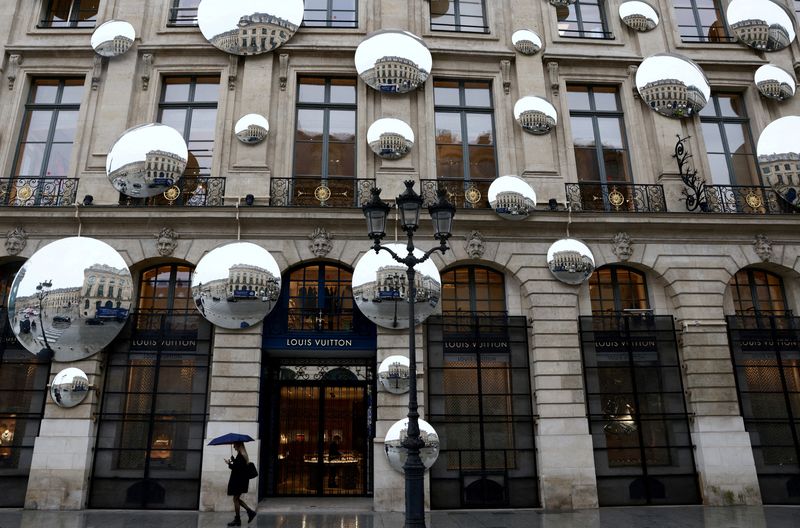By Casey Hall and Mimosa Spencer
SHANGHAI/PARIS (Reuters) - China's five-day Labour Day holiday in early May was once a good excuse for a quick European jaunt - with a side of luxury shopping on the agenda.
But with flights remaining limited after China's border reopening in January, European luxury stores will need to wait longer for the return of masses of tourists they once depended on for growth.
That may matter less to the bottom line of luxury firms than previously thought, although brands and investors are struggling to get a handle on the Chinese consumer recovery as domestic and overseas shopping habits shift after three unusual pandemic-hit years.
When it comes to high-end shopping overseas, retail industry executives and analysts say it may be more important to consider the type of Chinese visitors to Europe rather than just the numbers.
Air ticket prices from China to Europe are up to 80% more expensive than pre-pandemic, according to travel data firm ForwardKeys, and the number of travellers over the May holiday period was 64% lower than in 2019.
Those trickling back to Europe are mostly business travellers and wealthier people who have the means to travel "a bit differently", LVMH Managing Director Antonio Belloni said in an interview.
Chinese visitors to places like Paris and Milan now tend to be bigger spenders who are less sensitive to flight prices and more likely to secure visas because they can demonstrate larger amounts in their bank accounts, said Agility Research and Strategy Managing Director Amrita Banta.
The average transaction value by Chinese travellers in Europe in March was 28% above 2019 levels, UBS said, citing data from VAT refund provider Planet.
Cartier-owner Richemont, Hermes and LVMH were best placed to benefit from wealthy Chinese shoppers, UBS added.
LVMH's Belloni said changing travel trends after the pandemic meant Chinese tour groups would likely be the last to return, if they did at all.
Executives have been pressed by investors about how stores would cope with a sharp uptick in traffic, but Belloni said a more gradual return suited the retailer.
"No one is ready to manage a complete change in traffic flows, whether its stores, hotels or airplanes," he said.
Overall, luxury companies are focusing on courting wealthier shoppers with higher purchasing power, including at Gucci-owner Kering (EPA:PRTP), which is banking on new ultra-high-end "salons" offering merchandise priced at up to $3 million.
Luciano Santel, the chief corporate and supply officer at luxury retailer Moncler, on Wednesday told analysts that Chinese travelling to Europe still represented a "small contribution, but it is growing week after week".
Exane BNP Paribas (OTC:BNPQY) research released just before the Labour Day holiday said industry insiders in Paris and Milan reported Chinese consumers represented the third-largest spend after French and Americans - and sometimes the second-largest at stores in tourist areas.
As wealthy Chinese return to Europe and other foreign destinations, the appeal of China's Hainan Island, a duty free shopping hotspot, appears to be waning among top luxury spenders.
Imke Wouters, retail and consumer goods partner at consultancy Oliver Wyman, said discussions with sales staff in Hainan revealed that as many as 70% of those shopping for high-end goods on the tropical island were making their very first luxury purchase.
China's "higher income, top luxury spenders (are) already travelling abroad again," she said, leading to an observable lower per-capita spend in Hainan.
COMPARISONS WILL BE TOUGH
Luxury firms have reported the beginnings of a consumer comeback since February, led by Hainan, after China's border reopened and the country's wave of COVID-19 infections subsided.
The sector's biggest players, LVMH and Birkin bag maker Hermes have benefited most, as reflected in their global sales growth over the first quarter, up 17% and 23% respectively.
But comparisons will be clouded by the weak performance within mainland China last year, when there were sporadic COVID lockdowns that depressed spending and a major shutdown of Shanghai in the second quarter.
"It will be important this year to look at how companies are performing in comparison with the sector overall," said Jonathan Yan, a Shanghai-based principal at consultancy Roland Berger. "Double-digit growth won't mean a lot on its own."
Oliver Wyman's Wouters said 2022 was a strangely depressed year, but 2021 was a year of unusual growth after the initial outbreak in 2020 led to a massive reshoring of luxury spending to China.
Comparisons with 2019, when as much as 70% of the luxury spend of Chinese consumers was made abroad, are also largely irrelevant, with analysts predicting a return to that level of spending overseas is unlikely, even in the longer term.
"If you speak with luxury brands, they are kind of struggling to see what's actually the baseline to compare with," Wouters said.
